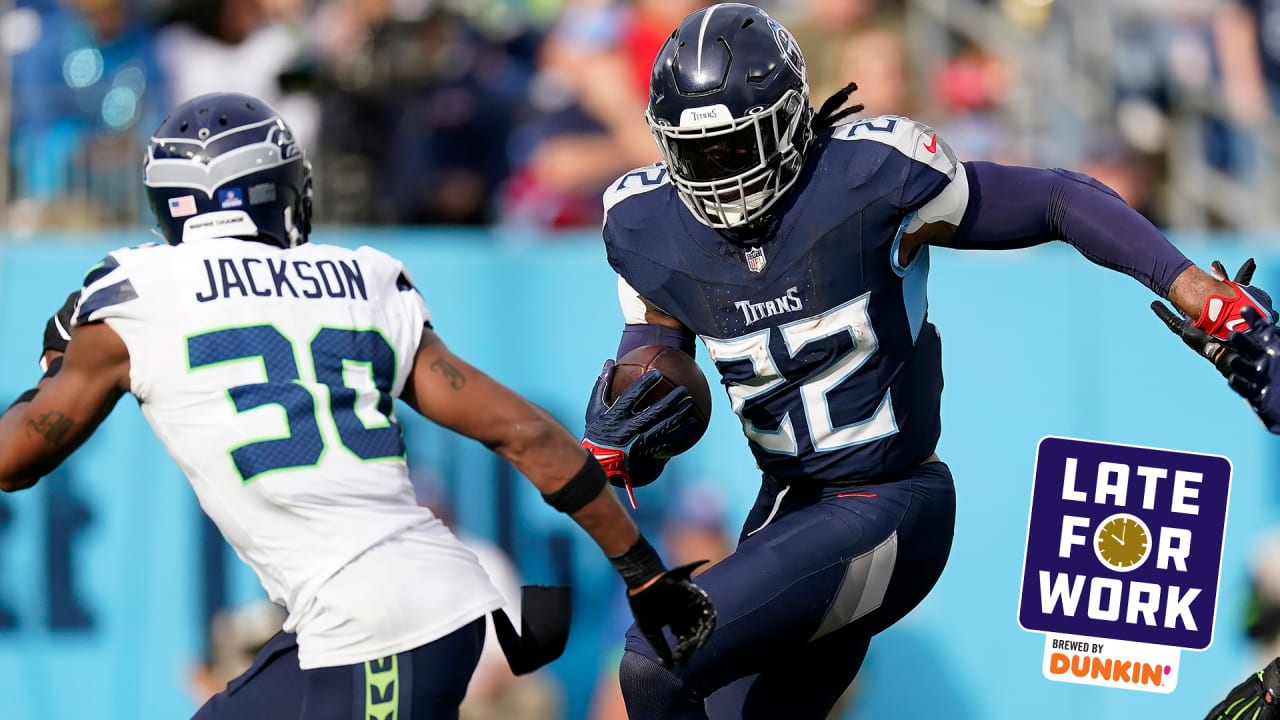Ravens trade pitch pairs Derrick Henry with projected $41 million star running back
The Baltimore Ravens have long been known for their dominant rushing attack, and with the addition of Derrick Henry in 2024, they solidified their status as a powerhouse in the ground game. However, recent trade speculation has linked the Ravens to a potential move that could further strengthen their backfield—acquiring Seattle Seahawks running back Kenneth Walker III. This move would pair Henry with a rising star who, despite facing injuries in 2024, remains a highly sought-after talent. But does this potential trade make sense for Baltimore? Let’s take a deep dive into the implications of such a move.
Derrick Henry’s Impact in Baltimore
Derrick Henry’s signing with the Ravens on a two-year, $16 million deal brought immediate dividends to Baltimore’s offense. In the 2024 season, he led the league in rushing yards and touchdowns, proving he still had plenty left in the tank. His bruising running style perfectly complemented quarterback Lamar Jackson’s electrifying dual-threat ability, making the Ravens one of the most feared offenses in the league.
Henry’s presence allowed Baltimore to control the tempo of games, wear down opposing defenses, and keep pressure off Jackson. But as the 30-year-old running back enters the latter stage of his career, the Ravens may be looking for a younger counterpart to share the load and provide insurance against potential injuries.
Kenneth Walker III: A Rising Star with Injury Concerns
Kenneth Walker III emerged as one of the league’s most promising young running backs during his rookie season with the Seahawks. His ability to break tackles, accelerate through lanes, and contribute in the passing game made him a versatile asset in Seattle’s offense. However, the 2024 season was a difficult one for Walker, as he dealt with multiple injuries, including oblique, ankle, and calf issues that limited him to just 11 games.
Despite these setbacks, Walker’s talent is undeniable. He remains a highly valued player, and his contract situation makes him an intriguing trade target. Currently, Walker is set to play out the remainder of his rookie deal, but he is projected to command a contract extension worth around $41 million. If the Ravens were to trade for him, they would need to consider both the immediate cost and the long-term financial implications.
Why the Ravens Might Make the Trade
1. Creating a Two-Headed Rushing Monster
Pairing Henry’s power running with Walker’s agility and elusiveness could create one of the most dynamic backfields in the NFL. Henry would continue to handle the bulk of inside runs and short-yardage situations, while Walker could provide a change of pace and contribute as a receiving threat out of the backfield.
2. Load Management for Henry
Henry has carried a heavy workload throughout his career, and while he remains a dominant force, reducing his number of carries could help prolong his effectiveness. By acquiring Walker, the Ravens could strategically split touches between the two, keeping both backs fresh for the playoffs.
3. Insurance Against Injuries
The NFL is a physically demanding league, and injuries are always a concern, especially for running backs. Having a talented backup like Walker would provide much-needed depth in case Henry misses time due to injury.
Why the Trade Might Not Happen
1. Injury Concerns with Walker
While Walker is immensely talented, his recent injury history raises questions about his durability. The Ravens must determine whether investing in a player with a history of nagging injuries is worth the risk.
2. Financial Considerations
Walker’s projected $41 million contract extension would require Baltimore to allocate significant salary cap space to the running back position. The Ravens already have several key players to extend, including safety Kyle Hamilton and wide receiver Zay Flowers. Prioritizing cap space for a running back could impact the team’s ability to retain other core players.
3. Cost in Draft Capital or Players
Seattle would likely demand a high price for Walker, potentially including a second-round draft pick or a promising young player. Given the depth of running backs in the NFL Draft and free agency, the Ravens may find it more cost-effective to pursue alternative options rather than trade valuable assets for Walker.
Current Running Back Depth and Future Outlook
Beyond Henry, the Ravens have solid depth at the running back position. Justice Hill, who signed a two-year, $6 million extension, has proven to be a capable backup with strong pass-catching abilities. Gus Edwards remains a reliable veteran option who has performed well in short-yardage situations.
With this existing depth, Baltimore may not feel the urgency to make a major move for Walker, especially given the potential costs involved. Instead, the team could look to draft a young running back or sign a more affordable free-agent option.
Should the Ravens Trade for Walker?
The idea of pairing Derrick Henry with Kenneth Walker III is an exciting one, but it comes with significant trade-offs. While the move would give the Ravens one of the most talented running back duos in the league, concerns over Walker’s injuries, financial demands, and the cost of acquisition make this a complicated decision.
Ultimately, Baltimore’s front office must weigh the short-term benefits against the long-term impact on the team’s salary cap and roster construction. If the Ravens believe Walker can stay healthy and fit within their financial plans, the trade could be a game-changing move. However, if the risks outweigh the rewards, Baltimore may be better off sticking with their current backfield and addressing other pressing needs.
As trade rumors continue to swirl, one thing is clear: The Ravens remain committed to building a championship-caliber roster, whether that includes Kenneth Walker III or another key addition.



